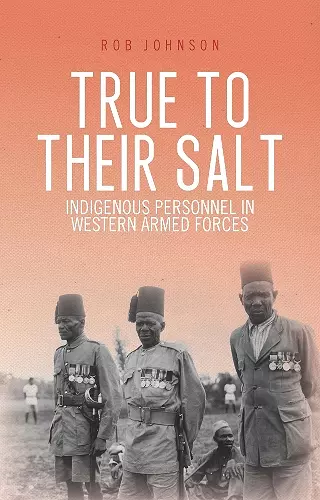True to Their Salt
Indigenous Personnel in Western Armed Forces
Format:Hardback
Publisher:C Hurst & Co Publishers Ltd
Published:12th Oct '17
Currently unavailable, and unfortunately no date known when it will be back

In the last decade an Iraqi Army and an Afghan National Army were created entirely from scratch, the founding of which was deemed to be a crucial measure for the establishment of security and the withdrawal of Western forces from Iraq and Afghanistan. Raising new armies is always problematic, especially during an insurgency, but doing so outside the sovereignty of one's own state raises questions of legality, concerns about their conduct and the risk of an over-empowered local military. The recruitment of proxies, including former insurgents, or the arming of local fighters and auxiliaries, levies and militias, may also exacerbate an internal security situation. In seeking answers to this conundrum Rob Johnson turns to history. His book sets out how recruitment of local auxiliaries was an essential component of European colonialism, and how, in the transfer of power and security at the end of that colonial era, the raising of local forces using existing Western models became the norm. He then offers a comprehensive survey of the post-colonial legacy, particularly the recent utilisation of surrogates and auxiliaries, the work of embedded training teams, and mentoring. Rob Johnson is Departmental Lecturer in the History of War, University of Oxford, and author of The Afghan Way of War: Culture and Pragmatism, A Critical History, published by Hurst.
‘Rob Johnson is becoming a familiar figure in this Journal’s reviews, and deservedly so . . . this is a well-written, almost magisterial treatment of a complex subject.’
'This extraordinarily rich, detailed and nuanced volume should be required reading in Western militaries.'
'An important and highly significant book on "burden-sharing" by Western military powers through the hiring of local allies -- at once relevant for history and for current military affairs. Johnson argues forcefully that Western governments’ assumption that they can achieve their aims with airpower and local forces alone is deeply misguided.' -- Jeremy Black, Professor of History, University of Exeter
'"True to Their Salt" is an ambitious "grand narrative? treatment of the nature and experience of indigenous forces recruited by Western powers during the days of empire, and more recently. Embracing a diverse range of case studies, it offers a unique overview that will make it a standard work of reference.' -- Ashley Jackson, Professor of Imperial and Military History, King’s College London; author of 'The British Empire: A Very Short Introduction'
'In a major work Johnson sets out a provocative and compelling case for the use of indigenous forces as a 'force multiplier' in contemporary military operations but as he admonishes, only if we understand the pull/push forces that lead men to enlist, and only if we have the cultural knowledge that will allow us to make the most of this untapped cultural capital.' -- Christopher Coker, Professor of International Relations, London School of Economics and Political Science; author of Rebooting Clausewitz: ‘On War’ in the Twenty-First Century
'This book should be read by anyone -- politician, general, journalist or scholar -- who thinks that the current Western approach to conflict in the Middle East is going to result in the stabilisation of the region and the strengthening of allied governments. Johnson expertly dissects how local auxiliaries, Western special forces and airstrikes will not lead to a promised land without a greater investment in understanding the host societies in which the West is trying to operate. An excellent read.' -- Mike Martin, author of 'An Intimate War: An Oral History of the Helmand Conflict'
‘Densely researched and very well documented . . . provides a sharp analysis of the recruitment, deployment, and devolution of local forces in often unorthodox war contexts and security situations.’
ISBN: 9781849044257
Dimensions: unknown
Weight: unknown
240 pages